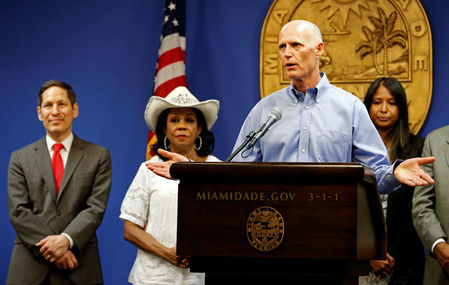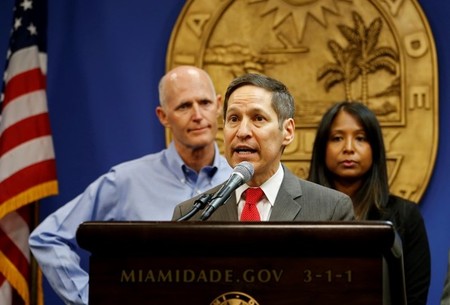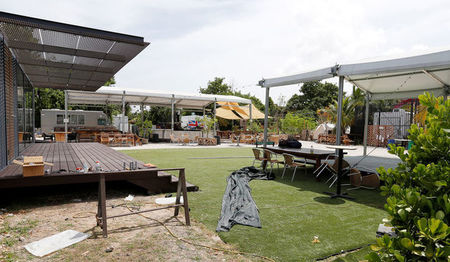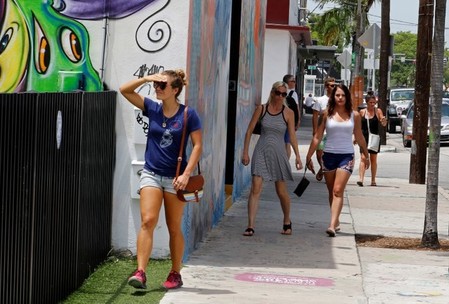Advertisement
Spraying by air for mosquitoes, Florida steps up Zika fight

By Zachary Fagenson
DORAL, Fla. (Reuters) – Florida began aerial spraying on Thursday to kill mosquitoes in a Miami neighborhood with the first U.S. spread of the Zika virus that can cause a rare but devastating birth defect.
Beginning at dawn, Miami-Dade County authorities sprayed droplets of an insecticide called Naled, marking their first aerial mission since local transmission of Zika was confirmed in an area of about a square mile (2.6 square kms) around the trendy Wynwood arts district near downtown Miami.
Spraying planned for Wednesday was delayed because of rain.
The impact immediately appeared to be more successful than earlier mosquito control techniques, said Dr. Tom Frieden, director of the U.S. Centers for Disease Control and Prevention.
“They had very high kill rates in the mosquito traps there,” he said at a news conference.
He explained that the aerial spraying inserts insecticides into places that cannot be reached by fogging trucks or ground crew spraying chemicals from backpack units.
Authorities sought to quell any concerns about safety from the chemical when sprayed appropriately, noting Naled has long been used in controlling mosquitoes in Miami-Dade County and around Florida. Local authorities said they are considering spraying another aerial agent to target mosquito larvae over the weekend.
Florida health authorities have identified 15 Zika cases spread by local mosquitoes and expect there may be more, although no additional cases were reported on Thursday.
State health officials are investigating one case from outside of the affected Wynwood district. However, authorities stressed that an isolated case was not yet enough to indicate a second area of active transmission.
State officials are also monitoring 393 cases linked to travel abroad, which include 55 cases involving pregnant women.
Florida Governor Rick Scott added his voice to a growing chorus of frustration over Washington’s inaction on approving additional funds to combat Zika.
While Republicans and Democrats in Congress pointed fingers at each other, Scott hoped the federal government would act. But if not, he said the state would find the resources needed.
“We will make sure we do the right things in the state,” he said at a news conference.
President Barack Obama on Thursday called on Congress to approve more funds to fight Zika’s spread in the United States, saying that money to fight the outbreak is rapidly running out.
Earlier on Thursday, Scott visited Wynwood’s hip restaurants and spoke to local business owners, encouraging residents and visitors to do the same.
While health officials have advised pregnant women not to travel there, Zika is considered a mild illness outside of the threat to newborns. Up to 80 percent of people infected show no symptoms from the virus that has spread rapidly in the Americas since it was first detected in Brazil last year.
Florida will provide free Zika testing for pregnant women at county health departments across the state, and health officials have recommended that any expecting mothers who visited the Wynwood area since mid-June should be tested.
One baby born in the state to a woman infected in Haiti has been diagnosed with the birth defect microcephaly, a condition defined by small head size that can lead to developmental problems.
(Writing by Letitia Stein; Editing by Bernard Orr)















